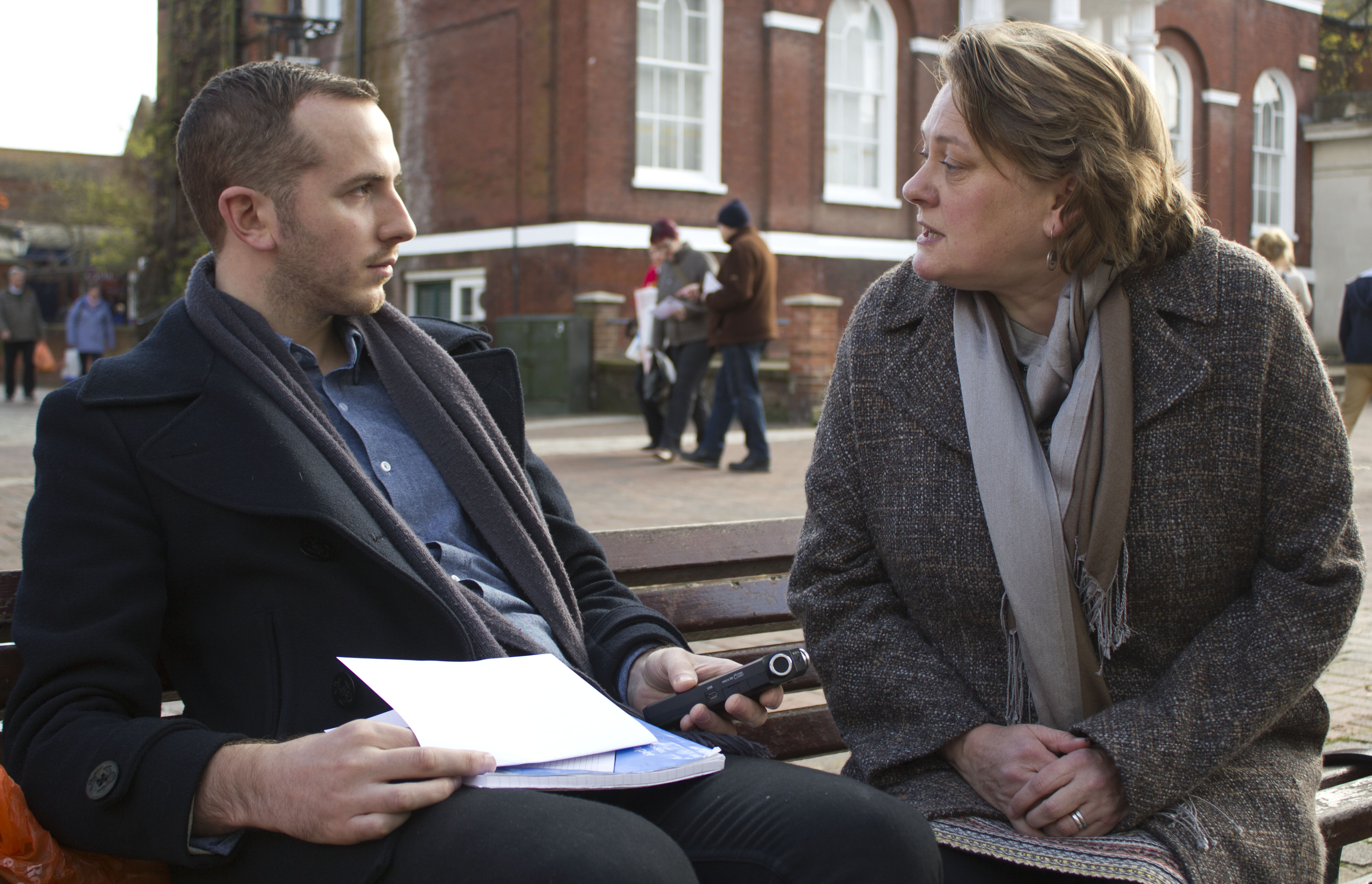On November 15, voters will cast their ballots to elect the first ever Police and Crime Commissioners to 41 police areas across England and Wales. The role, introduced by the David Cameron coalition, is intended to foster a greater relationship between the police force and the community. But many see it as yet another level of bureaucracy that will further complicate local policing.
Rachel Rogers is among those who do not favour the idea of PCC. Despite her reservations, Rogers is the Labour party’s candidate for the job in Dorset. Having originally begun her career in the Prison Service in 1992, Rogers moved to Weymouth in Dorset when she began work at the HMP Portland. In 2001, she became a senior caseworker for Jim Knight, the then Labour MP for Dorset South. She was elected to the Weymouth and Portland Borough Council earlier this year. Excerpts from an interview that James Brooks recorded with Rogers during her campaign in Poole:
What made you want to run for PCC?
Well, I think the Police and Crime Commissioner is a really huge job. It’s got a huge budget and a huge responsibility, looking after community safety for all people in Dorset and I think my background gives me the skills and abilities to do that to a good level.
You were working for the Dorset MP before?
I’ve had a variety of different jobs. I spent 10 years working for the prison service and I ended up as deputy governor at the HMP in Portland, which brought me to Dorset in the first place. After that I worked for Jim Knight when he was Labour MP for Dorset South. I’m a qualified teacher so I’ve worked for young people in West Dorset as well, and I currently work in the field of children’s rights. I think that’s a wide range of experience both in the field of public service and criminal justice. So I think that gives me the skills for the role and when I saw the job, I thought that’s something that I could do.
Your experience is in prison service. You do not have experience in policing. Do you think that would be detrimental?
Absolutely not. I think actually two of my strengths are I’ve never been in the police service and I’ve never been on the police authority, which means I can bring a fresh eye to what’s happening. The police and crime commissioner isn’t a member of the police service. They’re not a policeman, they’re the voice of the people and a community representative and frankly, I think if you’ve got too much experience of policing then effectively you’re contaminated.
The PCC role is to do with police strategy as opposed to police operations. How will you be making decisions to do with strategy?
The first thing you have to do as PCC is to consult with the public to find out what their concerns about police and crime are. You need to do that in a variety of different ways, not just going to meetings because there’s a certain type of people that always goes to meetings. So you need to consult wider and you need to establish networks and find out what people want you to establish, what priorities are for crime and safety across Dorset. They won’t be the same in Bournemouth and Poole as they are in rural Dorset. So you need to have variety there and then you need to use those priorities to work with professionals to establish some kind of evidence-based solutions to the problems they’re experiencing. You don’t ask the public what the solution is in the same way you don’t ask the patient to diagnose their own illnesses. So once you’ve set those priorities and you’ve established what those solutions are, then you use the budget that you’ve got to work with the police on one hand and the community safety sector on the other hand to find the best strategies dealing with those problems. That doesn’t require you to be an expert on policing because there’s experts on policing in the police, they’re the people that you consult for the evidence-based solutions.
Is this job going to be reducing police spending?
Well, it’s not the job that’s reducing spending. It’s the government that’s reducing spending, because the government’s cut the budget for police spending by 20 per cent. That’s going to mean the loss of over 300 police officers over Dorset and more than 200 staff. Her Majesty’s Director of Constabulary was very clear the maximum the police force could reasonably take was 12 per cent. So there’s a gap there of eight per cent, and you have to ask yourself, how do they expect us to plug that gap?
How would you go about that?
One of the things we need to be looking at is where there is areas of overlap and where there is gaps that need filling. The police force have already worked quite a long way to finding a way of reducing staff and minimising the impact that that has on communities. But clearly it is something that I would have to look at closer. The contact that as candidates we have been able to have with the police force over the past six months has been very minimal. So in terms of establishing huge amounts of details it’s been very complicated. It has been made very difficult to have contact with individual police and i has been difficult for them to talk to us. So frankly it is one of the things that the Police and Crime Commissioner is going to have to get on board on very quickly when they get elected.
Does this mean fewer ‘bobbys on the beat’?
I don’t think it necessarily means that. I’ve made a very big commitment to keeping the police in neighbourhood policing as I think it builds trust in communities and once you’ve got trust in communities for police, whether that be officers or PCSOs or specials, that builds trust, it means people will report crime they have been a victim of or witness to. It enables you to build up intelligence and the police can target their resources more effectively. On the other hand, if you pull the police, in whatever form, out of communities then you lose that trust and you lose that confidence. People are less willing to report crime and it looks like crime is going down when actually it isn’t; it is the reporting of crime that’s going down and that’s a very different thing.
How does your Labour party affiliation affect you?
At the end of the day all PCCs are going to be politicians, because spending public money is unmistakably a political act. It doesn’t matter what party affiliation you have. You are going to have to make decisions based on your own values. Now my Labour label tells you what my core values are. They are fairness and justice and social equality and that’s very transparent as far as I’m concerned. I couldn’t possibly tell you every decision which I would make in the next four years, but what you could do is have a pretty fair guess judged on the fact that I am a member of the Labour party, which way I’m likely to swing. But at the end of the day, I don’t think I do because I’m Labour, I’m Labour because I think like I do, and I think that if anybody has some idea that there will be centralised control of PCCs they basically don’t understand how political parties operate. There is no centralised function that can control people in the field.
Should the public be entrusted with choosing the new PCCs?
Firstly, it wasn’t Labour party policy to put PCCs in the first place, that’s government policy so I’m not going to be defending government policy here. The government has decided to add an extra democratic layer to the way in which policing and community safety is managed and that’s entirely their job to do as a government. I think you may well have got more appropriate candidates if you’d done it through appointment rather than through election and frankly if I was going to do it that’s probably what I would have done, but it would have caused an equal amount of storm but in a different direction. Unfortunately, we are where we are, we’re going to have elections, they’re going to happen on November 15. Not voting is not going to stop it from happening, it’s just going to mean the choice is made by fewer people and if you don’t vote you won’t be able to have your say. The election is happening on November 15, the policing budget is being cut by 20 per cent and the governments chucking £100 million at putting on elections that they haven’t really bothered to tell anyone about. They put them on at a time of year when nobody goes out to vote, they failed to give the information to the electorate. The electorate are going to be voting blind about an election when they don’t know what the post is about. Frankly I don’t think that’s very democratic.
You don’t seem a fan of it despite the fact you’re running for it.
I’m not a fan of it. I’m not particularly a fan of Police and Crime Commissioners. I’m definitely not a fan of having people voting in November for a post that they know nothing about. I think the government’s attempts to advertise the post has been lamentable and that’s putting it politely. They haven’t managed to advertise it effectively to wider sections of the community and they’ve only advertised half the job, because if you looked at the advert you’d think we were electing ‘super cop’ and frankly we’re not, but at the same time it’s happening, we need to do the best that we can to try and promote the elections and try and get people to vote on an informed basis.
How are you going about campaigning are you educating people about the role people or what you want to do?
The primary aspect of my campaign has completely been about educating people, about the fact the cuts are happening, what the impact of the cuts is likely to be, that there’s an election for Police and Crime Commissioner and what that job is going to be about. After that they can make their own minds up. I’m not in the business of telling people how they ought to vote, but I am in the business of making sure that if there is something to vote for then people know what they’re voting for and they go out and make their voices heard.
Has funding played an issue in campaigning?
Absolutely it has. The budget is enormous but there’s a massive difference between budget and funding. I doubt that there’s any candidate in the entire country that has funding that’s anywhere near the limit of the budget. But certainly candidates are funded on a very unequal basis and that has an impact on the amount of campaigning that you can do.
You’ve personally funded most of yours haven’t you?
Yes, aside from the fact that my deposit has been paid by the Labour party. I’m the biggest single fundee of my campaign, yes.
Stag and Hen culture in Bournemouth is a complicated issue. Do you think this is something that you’ll be tackling?
There’s a whole variety of sections that we need to think about here. Stag and Hen culture in Bournemouth, yes we need to be interested in the way that young people behave and the way they keep themselves safe. But also it’s a really important part of the nighttime economy in Bournemouth. It contributes hugely to the amount of money that comes into the town. It contributes hugely to employment and before we start cracking down on things like this we need to be thinking about what the long term impact of that might be. I think we also need to remember the fact that Bournemouth is not the only town in Dorset that has a Stag and Hen party culture, there’s also Weymouth which also has a big Stag and Hen party culture and if we forget Weymouth and focus solely on Bournemouth then we’re forgetting a large part of what goes on and I think we need to be focusing not just on Bournemouth but also on the rest of the county and it really worries me that we’re focusing on one town and sometimes only on a small part of one town rather than on the whole of the county.
You’ll be working on strategy in tandem with the Chief Constable who will work on operations, do you think there will be a grey area in the way in which you’ll be working together?
Yes the PCC role is definitely about strategy, it’s about setting targets, its about developing priorities, its about being strategic and knowing a strategic overview and the operational side of policing needs to be on the side of the chief constable. You’ll hear people say that the PCC elections is about putting politics into policing, that makes you think that politics has never been in policing before. That’s a load of nonsense really. Politics has always been in the organisation of policing. You’ve always had the home office funding policing, you’ve always had the home office setting targets and budgets. So to say that politics has never been in policing at all is just misleading, its a localisation of politics, but its not about putting politics into policing. I think that the line between strategy and operation is not always 100% clear and some decisions will bridge the divide and I think at this point what’s really important is the relationship between the Chief Constable and the PCC. If the relationship between the Chief Constable and the PCC is as good as it should be, they will define that boundary for themselves.
There could be a conflict of interest?
Yes historically there has, back in the 1990s when Michael Howard was the Home Secretary and Derek Lewis was Director General of the Prison Service. They had a similar argument about strategy and operations which resulted in Derek Lewis losing his job because he insisted that something was a strategic decision and should have been the responsibility of the Home Secretary and the Home Secretary said no it wasn’t, it was operational responsibility of Derek Lewis. That’s not necessarily a model which we would like to follow, which is why I say the relationship is key.
So it’s a case of finding your feet during the first few months?
Well absolutely, at the end of the day it’s an entirely new post, we’ve never had it before. We’re going to have 41 new PCCs elected on November 15 and Bill Bratton, from New York has said quite clearly that we’re running 41 different experiments across the country, well frankly 41 different experiments doesn’t exactly sound the best way to keep the public safe to me. But that’s what we’re going to be doing and everybody’s going to finding their feet and its an entirely new relationship. The PCCs are going to have a new office that hasn’t ever functioned before, the old police authority office is just used to dealing with the police and wasn’t used to dealing with the whole community safety aspect so they’re going to be finding their feet. The Chief Constable is going to be finding their feet because it’s going to be a different relationship, so everyone is going to be finding where they fit and I think relationship is absolutely key and the most important thing of the first six months of the PCCs incumbency is to be about building those relationships so you can make this thing work.
So are you optimistic about the role?
I think it’s an experiment, it could be a success and I think it could be a dismal failure. It will all be down to those relationships that are on the ground.











